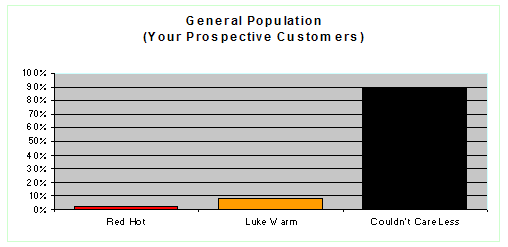For your business to succeed, you must advertise! You can't
just hang a sign out in front of your place of business and expect customers to flock to you. It isn't going to happen.
If yours is a new business, expect to budget at least 15 percent
of your first year's outlay to advertising. Some experts even recommend 20 percent that first year. If you survive your first
year in business you can reduce that percentage a little, but I wouldn't do it.
Keep in mind that, unless you're in the grocery business, only about
two percent of the consumers out there are red hot for your particular product or service. Another eight percent might
be lukewarm -- maybe they have it in the back of their minds they need a new car or would like to get a new computer
or stereo, or dress -- what have you. The other 90%? They couldn't care less! They aren't in the market right now.

The purpose of advertising is to create Top of Mind Awareness (TOMA)
for your business. That is, get that two percent of red hot prospects into your place of business to buy your product
or service. It should also get some of those luke warm prospects to file your business away in their memory for future reference.
Maybe even turn them into "red-hots." To create TOMA you need frequency. Simply put, frequency is the number of times your message is seen, read
or heard. The more frequency, the better the TOMA.
Most small business cannot afford much frequency if they rely solely
on print or TV. It's just too expensive in most markets. Radio, on the other hand, is usually relatively inexpensive. Radio
rates are always negotiable. There is so much competition out there for your advertising dollars in most markets that
radio account executives will bend over backward for your business. To get special rates though, you will have to deal directly
with a radio rep -- not an agency. Radio and TV stations and newspapers hate to do business with agencies in general, and
small local agencies in particular. The main advantages to going through an advertising agency are if you commonly use multimedia
campaigns or you're just tired of dealing with reps from all the different media.
My personal opinion on most print advertising is that it isn't worth
what you usually have to spend for it. If you have a "grocery list," i.e. a sale with lots of prices and comparisons, then
by all means use print. But use radio and/or TV to call attention to your print ad. It takes quite a few impressions (exposures
to your ad) to register with your prospective customer. One or two, or even a half dozen ads just isn't going to make the
impression you want.
Some things to avoid in your advertising: Radio and TV commercials
that are overproduced. Often electronic media producers fall in love with zowie sound and visual effects. These can distract
the consumer from your message. Avoid clutter in your print ads. Make them easy to read at a glance. Proofread your ad carefully
before it goes to print. Make sure the who, why, what, where, when are all in there. In print advertising you only
have one chance to capture the reader's attention. Once he or she turns the page, the image is gone and chances are, your
prospect won't come back to it. That's the advantage of electronic media -- you get more than one shot at conveying your message.
You will find some examples of simple radio spots on this site. Note how many times the place of business is mentioned.
If you are new to the advertising game, talk to someone you trust!
Other business people are a good source of information. Ask what works best for them. Find an advertising rep or marketing
advisor you can trust (yes, there are a few out there). Find out about co-op advertising. It can save you a bundle
of money if you qualify. Do not believe any rep who tries to overwhelm you with data from rating services such as ARBITRON.
These services are used by national and regional agencies to make radio and TV buys. Just tell your advertising reps what
your demographics are (age, sex, income, etc.). If you're selling luxury cars or expensive jewelry you don't want to advertise
on a radio station that only plays rap or hip-hop music. You wouldn't want to advertise during kiddy programming on TV either.
You know who your customers are better than anyone else and you need to be able to target your advertising toward them.
Advertising is much too complex to fully address here. There are people
who spend their whole lives studying the subject, and I'll bet you couldn't get any two of them to agree on what constitutes
the most effective method of advertising. There is one thing they all would agree on though: You don't just try
advertising. You invest in it.
If you want to pick my brain on advertising for free (at least the first
time), e-mail me, and I'll get back to you.
|
